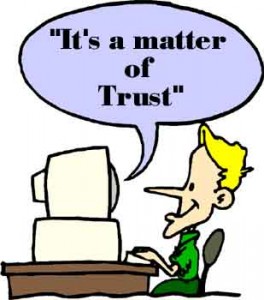By Rose O. Sherman, EdD, RN, FAAN
“I am not upset that you lied to me. I’m upset that from now on I can’t believe you.” – Fredrich Nietzsche
 Kate Smith asked her nurse manager for a letter of reference for admission to a graduate nursing program. Her manager assured her that she was a great candidate for the program and she would be happy to write the letter. Kate followed up two weeks later and again was reassured that it was on the manager’s to-do list. The application deadline passed and the university notified Kate that her application was incomplete as she was missing one of two letters of reference needed for admission consideration. She would have to wait until the following semester for admission. Kate was very upset and told her co-workers what had happened. They advised her not to take it personally as their manager was notoriously unreliable on timely follow-up of requests made by staff.
Kate Smith asked her nurse manager for a letter of reference for admission to a graduate nursing program. Her manager assured her that she was a great candidate for the program and she would be happy to write the letter. Kate followed up two weeks later and again was reassured that it was on the manager’s to-do list. The application deadline passed and the university notified Kate that her application was incomplete as she was missing one of two letters of reference needed for admission consideration. She would have to wait until the following semester for admission. Kate was very upset and told her co-workers what had happened. They advised her not to take it personally as their manager was notoriously unreliable on timely follow-up of requests made by staff.
The story above illustrates a breech of trust although the nurse manager involved may not realize it because it has become a behavioral pattern. In today’s work settings, nurse leaders play a central role in determining the overall trust level on their units and expectations of staff regarding trust. Their ability to establish, grow, extend and restore trust is a key leadership competency. As a new leader, you build trust through your character and your competence in managing your responsibilities. Trust is the foundation of effective relationships. High trust environments correlate positively with high degrees of staff engagement, commitment and organizational success.
In his book The Seven Habits of Highly Effective People, Stephen Covey talks about the emotional bank account. This is a great way for nurse leaders to think about trust in their work settings. If as a leader, I make deposits with you in this emotional bank account through courtesy, kindness, honesty and keeping my commitments then I build a reserve. Your trust in me grows and I can call upon that trust when I need it. When trust is high, communication is easier and more effective. If instead as a leader, I show a lack of concern, disrespect or overreact in situations then my emotional bank account is overdrawn and you distrust me. Trust requires constant deposits. If I do make mistakes as a leader but I have a large deposits in the emotional bank account then you will be more likely to forgive me.
Thirteen Behaviors of High Trust Leaders
- Talk straight
- Demonstrate respect
- Create transparency
- Right wrongs
- Show loyalty
- Deliver results
- Get better
- Confront reality
- Clarify expectations
- Practice accountability
- Listen first
- Keep commitments
- Extend trust
Mending Trust if You have Broken It or have been Betrayed by Another
If you have broken a trust, it is important to take responsibility for your actions. Acknowledge that the other person has the right to be angry with you and it will take time to rebuild their trust. Accept that their will be discomfort and tension in the situation until you regain trust. Let go of your own shame and guilt and move on. You cannot rebuild trust if you constantly beat yourself up for what happened.
You may be the one who feels betrayed. It is important to validate that what you are feeling is grounded in fact. Talk to the person or persons involved but try to be unemotional in your presentation. Sometimes, we are too sensitive and there was no harm meant. Ask someone who knows you well whether you are too sensitive and perhaps over-reacting to the situation or being unrealistic in your expectations. Be graceful and forgiving and avoid gossiping about the situation. Give others an opportunity to rebuild trust with you.
The best nurse leaders focus on the creation of trust as an explicit objective. They recognize that in health care environments, it impacts the quality of every relationship, every communication, every work project and every effort that nursing team engages in.
Read to Lead
Stephen Covery (1989). The 7 habits of highly effective people. New York: Simon and Schuster.
Stephen Covey (2009). How the best leaders build trust.
Twibell, R. & Towsend, T. (2011). Trust in the workplace, build it, break it, mend it. American Nurse Today. 6(11).
© emergingrnleader.com 2012


 LinkedIn
LinkedIn Instagram
Instagram